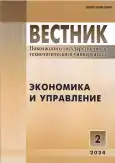Tokens and Stablecoins in the System of Digital Financial Assets: Foreign Experts’ Position
- Autores: Lisovskaya I.A.1, Kocharyan E.S.1
-
Afiliações:
- Russian Presidential Academy of National Economy and Public Administration
- Edição: Nº 2 (2024)
- Páginas: 60-69
- Seção: FINANCE
- URL: https://journal-vniispk.ru/2306-2800/article/view/292377
- DOI: https://doi.org/10.25686/2306-2800.2024.2.60
- EDN: https://elibrary.ru/PJWGVM
- ID: 292377
Citar
Texto integral
Resumo
Introduction. The rapid development of IT technologies is one of the factors of digitalization of economic systems and the emergence of qualitatively new objects, including digital financial assets (DFAs). Given the novelty and recognition of their high potential, DFAs are of great theoretical and practical interest to Russian and foreign scientists and specialists, which is why the issues of defining the essence of DFAs, their classification and legal regulation are currently important and topical.
The purpose of the article is to analyze the works of foreign specialists on the issue of DFAs and their role in the modern world economy with the aim of identifying the potential of their application in the Russian financial system.
Methods. In order to correctly understand the essence of DFAs, theoretical studies and methodological developments presented in foreign literature were analyzed. In the case of Russia, the term ‘digital financial assets’ is not identical to that of ‘cryptocurrency’, which requires taking into account the relevant differences in terminology. Thus, in the research and practice of US specialists, it is accepted that everything that has any digitized cryptographic form is a crypto-asset.
Results. The study has revealed the differences in the composition of objects categorized as digital. The differences have become established in the domestic and international practice due to peculiarities of applied terminology. Classification criteria for digital assets have been defined, which include the type of use (valuation metric or accounting unit) and the functionalities in relation to the activity of a business entity. This approach made it possible to distinguish cryptocurrency and tokens as separate types. It is shown that cryptocurrencies are the only type in the DFA classification that can be used as a means of payment, which contributes to their great popularity. Stablecoins are considered as a separate type of cryptocurrency. The importance of digital assets has been determined in terms of enhancing financial investment, expanding the access to safer and more affordable financial services, as well as their usage for cross-border payments. The latter is of significant interest for domestic business, also in relation with the current sanctions and restrictions on the movement of capital and cash flows.
Conclusion. Along with their potential, DFAs carry significant risks. In this regard, public financial institutions must be both technically and legally prepared to work with digital assets in order to prevent conflicts of interest between partners from different jurisdictions, which may arise due to differences in the legislative and regulatory frameworks of the respective markets.
Palavras-chave
Sobre autores
Irina Lisovskaya
Russian Presidential Academy of National Economy and Public Administration
Autor responsável pela correspondência
Email: lisovskaya_ia@mail.ru
Código SPIN: 6105-3974
Doctor of Economic Sciences, Docent, Professor of the Department of Financial Management, Managerial Accounting and IFRS at the Faculty of Finance, Technology and Management
Rússia, 82, Prospekt Vernadskogo, bld. 1, Moscow, 119571Eduard Kocharyan
Russian Presidential Academy of National Economy and Public Administration
Email: lisovskaya_ia@mail.ru
Postgraduate student of the general academic postgraduate course
Rússia, 82, Prospekt Vernadskogo, bld. 1, Moscow, 119571Bibliografia
- Federal Law 259-FZ “On digital financial assets, digital currency and on amendments to certain legislative acts of the Russian Federation” dated July 31, 2020 (as amended on July 14, 2022). Available from: https://www.consultant.ru/document/cons_doc_LAW_358753/ [Accessed: 18 February 2024]. (In Russ.).
- Van der Linden T., Shirazi T. Markets in crypto-assets regulation: does it provide legal certainty and increase adoption of crypto-assets? Financial Innovation. 2023;9(1):22. doi: 10.1186/s40854-022-00432-8
- Scott H. S., Gulliver J., Kortje C. A Review of cryptoasset market structure and regulation in the United States. Program on International Financial Systems. Cambridge, USA: PIFS Publ.; 2023. 54 p. doi: 10.2139/ssrn.4344838
- Liao G. Y., Caramichael J. Stable-coins: growth potential and impact on banking. International Finance Discussion Papers 1334. Washington: Board of Governors of the Federal Reserve System, 2022. 26 p. doi: 10.17016/IFDP.2022.1334
- Kashyap R. Bringing risk parity to the DeFi party: a complete solution to the crypto asset management conundrum. SSRN Electronic Journal. 2023. doi: 10.2139/ssrn.4525100
- Lisovskaya I. A. Digital financial assets in Russia: legal regulation, features and potential use. Vestnik of Volga State University of Technology. Ser.: Economics and Management. 2023;(3(58)):17–26. DOI: https://doi.org/10.25686/2306-2800.2023.3.17; EDN: KCVJED (In Russ.).
- Koshelev K. A. Trends in the evolution of the digital financial assets market in the context of the digital transformation of the global economy. Finance: Theory and Practice. 2022;26(4):80–94. doi: 10.26794/2587-5671-2022-26-4-80-94; EDN: HMMSUU (In Russ.).
- Digital financial assets in Russia: what they are and why investors need them. Available from: https://finex-etf.ru/university/news/tsifrovye_finansovye_aktivy_v_rossii_chto__eto_i_zachem_nuzhny_investoram/ [Accessed: 12 March 2024]. (In Russ.).
- Vasilyeva M. What are DFAs and how do they differ from crypto-currencies? Available from: https://www.banki.ru/news/daytheme/?id=10982667 [Accessed: 15 March 2024]. (In Russ.).
- Moradi Sani N. Digital financial instruments: the concept and types in the conditions of digital development. Business. Education. Economics: collection of papers of the International Scientific and Practical Conference (Minsk, April 07–08, 2022). Minsk: School of Business of Belarusian State University; 2022:411–416. EDN: KFWTMU (In Russ.).
- Digital financial instruments: cryptocurrencies and prospects for their legalization. Available from: https://delprof.ru/press-center/open-analytics/tsifrovye-finansovye-instrumenty-kriptovalyuty-i-perspektivy-ikh-legalizatsii/ [Accessed:15.03.2024]. (In Russ.).
Arquivos suplementares








